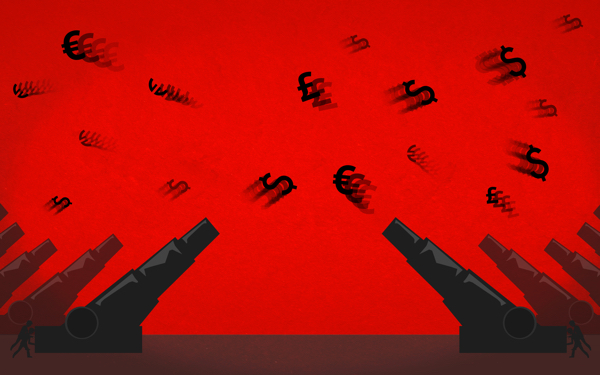
Thursday July 26: Five things the markets are talking about
In early trading, Euro bourses have advanced following a mixed Asian session overnight as capital markets contend with a host of stimuli, including an apparent easing of trade tension between the U.S and Europe and a flood of corporate earnings.
U.S President Trump has reached an agreement yesterday with E.C President Juncker aimed at avoiding a transatlantic trade war. The so-called compromise has gone some ways to ease market tensions fuelled by Trump’s threat to impose tariffs on Euro auto imports. Both parties have agreed to expand European imports of liquefied natural gas and soybeans and lower industrial tariffs on both sides.
U.S Treasures have edged up while the ‘big’ dollar trades steady after falling yesterday ahead of this morning European Central Bank (ECB) monetary policy announcement (07:45 am EDT). Elsewhere, crude prices have climbed as stockpiles fell, while gold has lost some of its lustre.
Will the ECB offer any surprises this morning?
On tap: As the week continues, more corporate earnings come on line. After Draghi’s press conference this morning, market focus will shift to tomorrow’s U.S GDP print – Trump and his economic team are increasingly convinced the GDP numbers will be strong – he expects Q2 GDP to rise as much as +4.8%! If so, it will be a very interesting last session of the week.
1. Stocks mixed results
In Japan, most stocks closed higher overnight on upbeat earnings and easing concerns about trade tensions. However, the Nikkei benchmark softened on speculation that the BoJ might trim their buy of ETF’s linked to the index. The Nikkei average shed -0.12%, while the broader Topix ended the day at a five-week high, rallying +0.7%.
Down-under, the Aussie stock benchmark quickly reversed initial weakness to spend the afternoon right round Wednesday’s closing level. As stock-specific news dominated the session, the S&P/ASX 200 finished down -0.05%. In South Korea, the Kospi was amongst Asia’s best performers, helped by gains in the country’s biggest stock. The index rose +0.7% as Samsung bounced +1.6% following the overnight strength in U.S tech stocks.
In China and Hong Kong, stocks ended lower as the Sino-U.S trade friction fuelled uncertainties over both countries economic growth. In China, the blue-chip CSI300 index ended down -1.2%, while the Shanghai Composite Index closed down -0.7%. In Hong Kong, the Hang Seng index fell -0.5%, while the China Enterprises Index lost -0.5%.
In Europe, regional bourses trade higher across the board with auto names helping the DAX outperform as news that the U.S has agreed to work with the E.U on lowering trade tariffs.
U.S stocks are set to open in the ‘red’ (-0.2%).
Indices: Stoxx600 +0.6% at 389.5, FTSE -0.1% at 7652 DAX +1.5% at 12769, CAC-40 +0.8% at 5469, IBEX-35 +0.8% at 9778, FTSE MIB +0.8% at 21,729, SMI +1.5% at 9153, S&P 500 Futures -0.2%

2. Brent oil higher as some Saudi Red Sea shipments suspended, gold lower
Brent crude prices are rallying after Saudi Arabia suspended its oil shipments through a key Red Sea strait in response to an attack on two of its tankers and as data showed U.S inventories at a four-year low.
Brent crude futures have rallied +55c to +$74.48 a barrel, hitting a ten-day high, while U.S West Texas Intermediate (WTI) crude futures are -4c lower at +$69.26.
Saudi Arabia said today that it was “temporarily halting” all oil shipments through the strategic Red Sea shipping lane of Bab al-Mandeb after an attack on two oil tankers by Yemen’s Iran-aligned Houthi movement.
Note: An estimated +4.8M bpd of crude oil and refined petroleum products flow through this waterway towards Europe, the U.S and Asia.
Yesterday’s EIA report showed that crude inventories fell -6.1M barrels in the week to July 20, compared with a market expectation for a decrease of -2.3M barrels.
Ahead of the U.S open, gold prices have shed their early gains overnight, as the dollar remains firm against the yuan amid a grim outlook for the world’s second-largest economy. Spot gold is down -0.3% at +$1,227.61 an ounce. U.S gold futures, for August delivery, are -0.3% lower at +$1,227.70 an ounce.

3. Sluggish economy to keep ECB dovish
Soft economic data in recent months should allow the European Central Bank (ECB) to remain cautious in its unwinding of its loose monetary policy and reason why today’s policy meeting is expected to be a non-event.
Eurozone PMI readings disappointed in July, showing a further decline from Q3 peaks in 2017. Data like this should keep the ECB in relatively “dovish” mood. Euro policy makers have no reason to second-guess markets, with EUR (€1.1715) strength an “unappealing” prospect. However, given the fact that the ECB did not amend its forward guidance on reinvestments at last months meeting, suggests that is still a lot to discuss and agree too in the other policy areas.
The yield on 10-year Treasuries has declined -1 bps to +2.96%, the largest fall in a week. In Germany, the 10-year Bund yield has increased +2 bps to +0.42%, while in the U.K, the 10-year Gilt yield climbed +2 bps to +1.274%.

4. The ‘big’ dollar is little changed
The DXY index is down by -0.2% ahead of the U.S open. To date, the USD had been the biggest winner of the trade war disputes and it’s not surprising to see the currency lower across the board on the back of easing global trade war risks.
Note: The dollar was trading at a +2-3% premium against most currencies relative to interest rate differentials and global risk sentiment.
EUR/USD (€1.1716) probed multi-day highs and the upper end of the July trading range, as the U.S-E.U seemed to reach a ceasefire in the looming trade war. Today’s ECB decision is being viewed as a “non-event” after the previously announced taper. Expect Draghi to be quizzed on clarity for the first potential rate hike language.
USD/JPY softer by -0.2% and back trading below the psychological ¥111 level at ¥110.78 as the market tries to anticipate possible moves by the BoJ at next week’s policy decision (July30-31).
The BoJ is expected to keep buying of ETF’s at ¥6T annually, but are said to be discussing reducing investment in ETF’s that track the Nikkei Stock Average in favour of those that follow broader indexes such as the Topix.

5. Venezuela to remove five-zeroes from ailing currency
Venezuela will remove five-zeroes from its bolivar currency rather than the three-zeroes originally planned.
President Nicolas Maduro said yesterday, “in an effort to keep up with inflation projected to reach +1M percent this year.
The OPEC nation’s economy has basically collapsed since the crash of oil prices left it unable to maintain its socialist economic system.
Last month, annual inflation topped +46K percent. The IMF said this week it could hit seven-digits in 2018, putting it on par with the crises of Zimbabwe in the 2000’s and Germany in the 1920’s.


